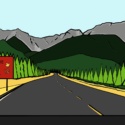How do we aid refugees and migrant individuals in their turbulent experiences? That’s what the Laurier community was invited to discuss at the resiliency of refugees panel.
Tuesday, March 5, as part research week at Laurier Brantford, the Laurier community was invited to discuss the circumstances that refugees and migrant individuals have to overcome to piece together better lives for themselves and deal with the trauma they are still experiencing.
On the panel was associate professor Bree Akesson, Professor Kristina Montero, Nora Melara-Lopez, Stacey Wilson-Fonsberg and Christopher Kynakides. They all spoke of the research or ground work they’ve done with refugees and migrant individuals.
A common theme among all the presenters was the sharing of personal accounts of having worked with refugees and migrant individuals or having been in those situations themselves.
Nora Melara-Lopez – a social worker and the North Hamilton Community Health Centre – said that her own experience as a refugee coming to Canada helped her in her line of work to support other refugees. Melara-Lopez detailed the long journey it takes to get any type of status, such as a permanent residence card, to be able to access more resources in Canada.
“I have a client that has been waiting for 16 years. It’s hard not being able to put down roots in this country,” said Melara-Lopez.
Stacey Wilson-Forsberg spoke about hearing trauma stories in an educational setting and establishing trust first between these individuals in order to receive such stories.
“We don’t go fishing for trauma stories…we listen empathetically,” said Wilson-Forsberg.
Olivier Lopez – an attendee at the panel discussion – came to Canada as a refugee back in 1985. Lopez felt that the discussion helped address a certain misconception and narrative that refugees are here to take and not to contribute more.
“I think the presentation … gives people an understanding of what refugees need here when they come upon arrival. It’s an understanding that refugees don’t come with the mindset of trying to take and burden but to gain a better life for their future,” said Lopez.
In the question and answer period of the panel discussion, one audience member asked how the scope of the work has changed for their field or research into refugees and migrant workers.
Professor Montero detailed the difficulty of separating people from the refugee label. “If you move away from that label maybe they won’t get enough resources,” she said.
Others spoke on the struggle to not feel hopeless under the circumstances of the refugees and the migrant individuals that they work with and continuing to support and aide them under difficult circumstance the best that they can.




